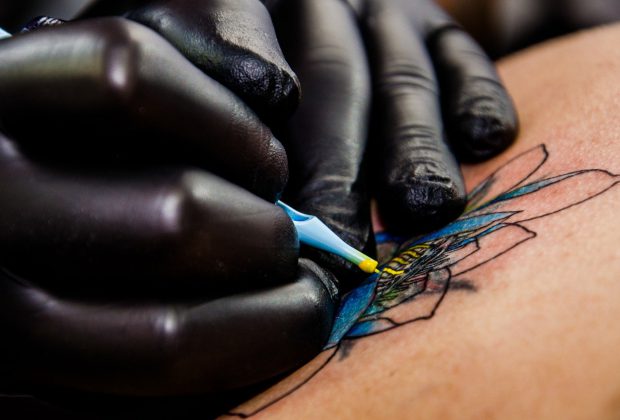Susan Campbell
Not too long ago, having a visible tattoo at work was frowned upon in certain professions such as law, healthcare and finance. American societal norms are rapidly changing, almost by the day. Many influential figures in the public eye have helped in the evolution of tattoo culture. This has inspired many who used to view tattoos as rebellious or tacky now see it as normal behavior in 2020.
Celebrities like Rhianna, Dwayne “The Rock” Johnson, Lady Gaga, Adam Levine and Post Malone are all body art enthusiasts. It is no surprise that other influential people have inked themselves in the name of creativity and individualism. The Prime Minister of Canada, Justin Trudeau even sports a tattoo on his arm.
In order to understand how this new way of thinking has occurred and has become common over the last four decades in The United States one must consider history and understand the act of getting a tattoo has actually been around for thousands of years.
The history of tattoos stems back to multiple cultures for various reasons and purposes behind the work. Sadly, these are not always due to personal choices or for reasons of happiness. It is important to resolve that during the Second World War; thousands of people were painted with the ID numbers of German concentration camps. It must be understood that this still brings painful memories to survivors and their ancestors. This had an impact on how some Americans and others across the world viewed body art and modifications.
Less than thirty years ago tattoos and non-traditional piercings were considered inappropriate unless you were a mechanic, record store associate or bartender. It’s a fair assumption to say that during this time, many people associated tattoos with drug addicts, bikers, and others who were considered criminal in some way.
Modern society has adapted to a culture that accepts and embraces those with tattoos, both men and women, with the same frequency. People with body-artwork work in a variety of industries and hold entry-level jobs as well as top senior executive positions.
For instance, the national sales manager of a distribution company can now be covered in tattoos from head to toe. Most would never be aware unless this person was spotted out in public on the weekend wearing a t-shirt and shorts on a summer day. Gone are the days that being heavily tattooed will prevent one from having gainful employment or earning a six-figure yearly salary.
Many professionals across the region have tattoos in a variety of places on their bodies and are employed in varied positions including but not limited to registered nurse, police communications operator, paramedic, active military (Air Force), public school teacher and finance project manager.
These specific professionals come from T Rowe Price, Baltimore County Public Schools, Comcast, Maryland Police, Greater Baltimore Medical Center, Baltimore City Fire Department, Traveler Insurance, and Northrop and Grumman.
A few of these employers do ask that an employee cover their visible tattoos, but others do not have such policies. Former Baltimore City School Teacher, Phillip Johnson explains, “I’m not 100% sure but I normally go into interviews with long sleeves so they can’t see my tattoos. I don’t think I’ve been discriminated against with my gauges.” (Earrings that widen the earlobe)
Johnson recalled a conversation with a supervisor when he was a teacher. “When I was interviewed as a teacher, I took my gauges out and asked about the dress code. The principal responded if I was referring to my earplugs. So, to my surprise she was already ok with me having stretched ears. However, I also was working as the Graphic Arts Teacher so that setting was acceptable with the look I suppose.” Johnson currently utilizes his bachelor’s degree in digital art ad-graphics as a freelance digital artist.
Some companies may require you to remove specific piercings due to safety reasons. If an employer adopts a new dress or appearance code, employees will have to follow it unless there are specific religious or cultural grounds not to. This is something that should be discussed with a human resources representative.
Justin McCoog, an active member of the US Air Force, explained his experience and views on tattooing in the armed forces.
“I personally see both sides of this coin. As someone with tattoos I believe they shouldn’t limit one’s employment possibilities.” As a manager at a video game store, McCoog had a medium-sized tattoo on his biceps. “However, many companies want to present a professional appearance and as private companies they can do that. With that said, I’ve come to agree most with the military’s policy on these items. When it comes to tattoos anything that isn’t vulgar, racist, etc. is allowed anywhere but from the collar line up and from the wrist to your fingers.” McCoog recently completed his bachelor’s degree in Aeronautics.
A first tattoo can be an incredibly exciting experience as well as nerve-wracking when considering possible consequences. Local tattoo artist, Justin Duvall had a few thoughts on this topic. He made some suggestions on the placement and design of tattoos.
“Well for a first tattoo, it’s always important to get it where you want it. Just make sure you get it where you can cover it up, if you haven’t found your career path yet. Unfortunately, many professional jobs are still biased to tattoos and, you don’t want to possibly ruin your future over a mistake you made as a young adult.”
Duvall continued his expert advice with some words of encouragement. “Other than that, if you want a tattoo and your future is set get it wherever you want! Also, it’s always better to go bigger, especially with more intricate tattoos.Whether you have a tattoo the size of a quarter or your arm is fully sleeved, you still have a tattoo. So, go big or go home!” Justin Duvall currently works out of Flesh Tattoo Company in Fallston, Maryland.
It’s important to note that many people have various reasons for getting their tattoos. It could be a memorial tattoo for a lost family member as one interviewee Jay Parish mentioned having a green lighthouse tattoo to honor their grandmother who passed away.
High-end wine and beer shop manager and nightclub disc jockey, Neska Lapicki mentioned how music has helped her through many of the challenges in her life. “The vast majority of my tattoos are band logos. Music has absolutely been my best friend and life-saver since early childhood.”
Lapicki added that her passion for music has transformed into a sustained force that inspires and comforts her. “My first tattoo was on my right forearm; the logo of a band that helped me to understand I was not alone in how I felt.”
In 2020 it appears society has become more accepting rather than making snap judgments about someone because of their body art. People in the workplace seem to be able to pause and embrace their colleagues’ individuality.
Modern-day human resource managers can now educate themselves about the cultures from which body art originates. This helps society as a whole understand the cultural significance of tattoos and can better spread an appreciation and acceptance of others who look different from what is deemed traditionally appropriate.
If being drawn to a Maori tattoo on a new colleague from New Zealand sparks one to learn more about their culture, this is an opportunity to embrace diversity amongst others in the modern workplace.















I love this article and that’s probably because I feel very strongly about tattoos because I am one of those individuals that have several. I also worked in an environment that frowned upon them and I believe if they aren’t offensive then there should be nothing wrong with it. Thank you for the article, it was a great read!
This was amazing, I agree and believe that tattoos shouldn’t be stigmatized and that there are various cultural, and personal reasons as to why people get them and this should not affect their employment possibilities.
I see both sides of the argument for tattoos at the workplace. I want to get a tattoo, but I am a finance major. I don’t want to have less of an opportunity for a job because of a tattoo.
In the past I’ve argued about this from both sides because I believe both are true, it shouldn’t hinder you from getting a job but businesses have a certain image to uphold. This is part of the reason I don’t have any tattoos, even though I’ve really considered getting one or two.
To me, tattoos do not represent a persons ability to preform a job. It would be ridiculous to assume someone is less qualified because of something meaningful they put on their own body.
I don’t think those with tattoos should be judged any different in the workplace. This is just another societal norm that is outdated and should be destigmatized. A persons ability to complete a task does not suddenly diminish because they have ink on their skin. I really liked this article and hope that attitudes towards tattoos in the workplace become more positive so that all those who feel like they are being held back from expressing themselves through tattoo art can feel free to do so.
I’m a firm believer in not passing judgment on someone who I know nothing about strictly due to the way they look or what is on their skin. It’s not always easy if you have grown up around media or people vocalizing and creating a stigma around tattoos. I see them as some of the highest forms of art today, and always had an admiration for them growing up. The amount of passion that comes from an artist and their customer to create a design and wear it on one’s skin for the rest of their life is truly a remarkable thing. The shear dedication that comes with sitting in that chair for an undetermined amount of time allows a person to create empathy with others when looking at one another’s pieces, allowing the passion for your body art and other’s to run deeper. Bashing people with your personal perception and limiting the opportunities available to them is not so much however. It’s good to know that these days the tattoos a person has won’t always determine the ability to achieve success and financial successes.
Tattoos are an interesting thing that many struggle to understand the meaning of with some believing in the cultural significance and other s viewing as self expression. The meaning may change from person to person but ultimately tattoos play a vital role in identifying a person by either culture or personal interest. For this reason workplaces tend to be very strict about them as they can be divisive for religious people who may be a little too opinionated on the subject of how society can be shaped. For me I’ve always thought of tattoos as a personal reflection with options like birthdays of deceased relatives or people who matter the most to you or symbols of mental health recovery like covering up a scar or the recent trend of semicolons representing the continuation of a journey.
Tattoos describe a person’s personality without them saying a word. It’s their form of self-expression. People with tattoos should not be discriminated against.
Great article! I personally don’t think that having tattoos should effect wether or not you get accepted a job because it doesn’t define you as an employee or a person. I never really understood why some jobs have certain tattoo restrictions and hopefully workplaces become more lenient as time goes on.
I love the article and I agree with you. I have no tattoos yet but I am currently in the process of getting in shape so I can be in good shape for when I get them because I love tattoos but I strongly dislike the negative stigma around them. I believe that actions should speak louder than words even if those words are forever printed into your skin.
I have a fried that works for Med Star, they still do not like or let their employees showing tattoos. Really ridiculous in 2020.
I See that alot employers always ask for tattoos to be covered, I believe that having tattoos doesn’t effect the abilities of the capability to work. I have 2 tattoos i feel some type of way when my mangers tell me they should be covered cause not like they are demeaning. They are very frowned upon in the work place.
Fantastic article, very well written! I am a firm believer that tattoos and piercings do not determine how good or bad of a person you may or may not be. I have multiple tattoos, and not one of them has a deep rooted meaning behind them besides it was cute, I liked it, so I got it! I have seen so many healthcare workers who are phenomenal at their job, and are covered in tattoos. It does not change your work ethic. Obviously, if you have a tattoo that is vulgar or hateful, that changes the game, but for the most part, I don’t know many people who would get hateful tattoos. Tattoo on, my friends!
A tattoo is simply and objectively an ink marking on the skin. It is the perception and connotations of the viewer who may assign meaning or stereotypes to it. Facing hardship in getting a job due to tattoos I think is based on stereotyping people with tattoos as something bad. It seems like a form of unfair discrimination to me because you are making assumptions based off the way someone looks and not the content of their character.